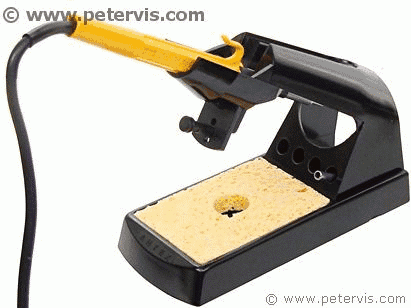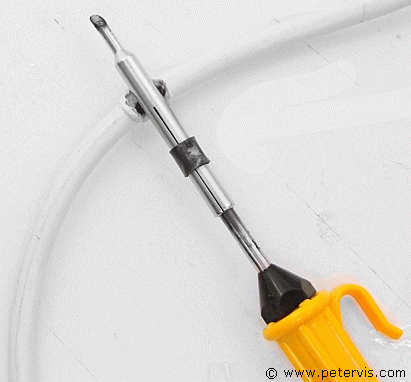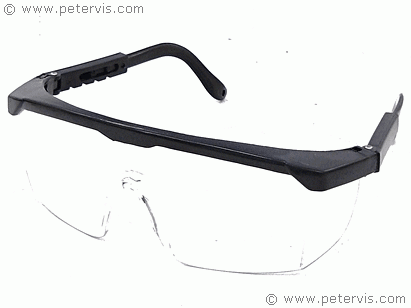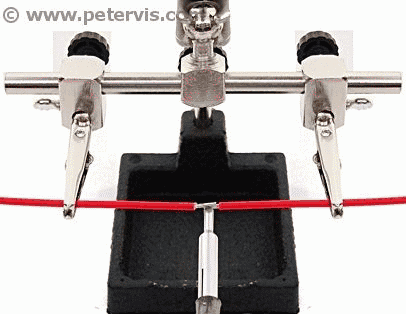Soldering Guide: Safety Tips
A soldering safety guide is the most important thing that all beginners and school kids should learn first. Soldering safety is not optional, and it is necessary that you should read and understand this before even picking up a soldering iron.
Do NOT Flick Solder

Flicking solder is dangerous; just use a wet sponge to clean the tip.
Always Use A Soldering Iron Stand

Stands are very cheap these days, and you can pick one up for very little money eBay. All professionals use them to keep the hot soldering iron from rolling over and touching the mains cord. I have written an article on my Antex ST6 Soldering Iron Stand, which seems to be the hot new product that you can buy cheaply on eBay.
Avoid Danger

If you are looking to buy soldering irons for school then you can now buy them with a shielded mains wire that is burn proof. They cost a little bit more but are far safer. If your soldering iron has a PVC cable then, the plastic will melt if the hot shaft touches it, and there is a serious risk of shock if that happens.
Always use a grounded mains outlet when using a soldering iron. Many good quality soldering irons will have a three-pin UK mains plug, where the earth wire is also used. Always choose an iron that has a 3-core wire consisting of an earth for that extra safety.
Should an accident occur in school, get your teacher’s attention straight away. If you are a teacher, hit that emergency power-cut button. If you do not have an emergency power-cut button then you need to switch off the power at the socket straight away.
Lead Poisoning

Label Elements EU Directive 67/548/EEC 1999/45/EC:
Risk Phrase: S37 – Wear suitable gloves
Label Elements EU Directive 67/548/EEC 1999/45/EC:
Risk Phrase: S24 – Avoid Contact with skin
You can become very sick if you put lead into your mouth. If you are using a lead based solder, then you should thoroughly clean your hands after use. Some engineers use gloves, because lead can get absorbed through the skin. If you handle lead solders with your bare hands, then you should remember to wash them thoroughly afterwards.
You might think that a little bit of lead will not harm, however if you are handling solders on a daily basis, then there will be a cumulative effect which can be a serious concern.
Solder Fumes

Label Elements EU Directive 67/548/EEC 1999/45/EC:
Risk Phrase: S23 – Do not breathe fumes
Although fumes have very little lead in them, they are still not good for you as they can contain halides that are bad for you. They can also contain rosin acid, which is not nice if you are an asthmatic, as it can trigger an asthma attack. Exposure to rosin fume may cause already sensitive individuals to develop eczema and/or asthma. Avoid fumes of any sort, because they are not good.
Buy A Solder Fume Extractor
Ensure adequate ventilation of the working area by extracting the fumes away from the breathing zone of the operators using a Local Exhaust Ventilation (LEV) system. Please read the indg249.pdf for further information.
Factories usually have an LEV fume extractor system, which sucks the solder fumes away and channels them outside. These normally cost thousands of pounds. If you are a student, or an educational establishment, then this will obviously be out of your budget range. The good news is that there are modern solders available that are completely free of lead, rosin, and halides, and you just need to make sure that you are soldering in a well-ventilated area. Omega solder is lead-free, rosin-free, and halide-free.
Solder fumes have a mind of their own. Have you noticed how they always follow your nose, no matter which way you turn your head? If you are doing some close-up soldering for a day, you are going to get fumes into your eyes, besides breathing it in. One cheap way to solve this problem is to place a small fan next to the PCB that you are working on. If the fan is powerful, it will blow the fumes away from your face thus avoiding your eyes and nose. It is not a perfect solution but goes a long way towards minimising direct exposure.
If you are working for an electronics company ask them to invest in a bench top fume extractor. These portable low cost devices can extract the fumes, and safely neutralise them.
Do NOT Touch The HOT Tip
There is always someone like my friend Rufus, who has a shortage of brain cells and needs to be told! Do NOT touch the soldering iron tip because it will be hot! There is a serious risk of burning yourself and therefore you should be extra careful.
If you are buying for schools or colleges then you need to have a soldering iron that is low wattage such as 15W. It still has a very hot tip with temperatures reaching well over 390 °C, but has a much lower heat reserve. 30 W and 40 W soldering irons have a greater heat reserve capacity and can therefore burn through tough materials faster, hence in the hands of inexperienced children can do more damage.
You can also buy soldering irons with a metal guard. The guard covers the hot part of the soldering iron, leaving just a small part of the tip exposed for soldering.
If you burn yourself with a small burn then the standard advice is to place the area under a cold-water tap for 15 minutes. Do not apply any creams or ointments, and seek medical attention.
Wear Eye Protection Such As Goggles

If you are soldering something very small, you will end up with your face very close to the PCB whilst soldering. You should always were goggles because solder can spit and you want to avoid getting that into your eyes.
There will also be hot fume gases generated and if your face is too close to the PCB you will end up getting that into your eyes as well - it is very unpleasant and dangerous.

Label Elements EU Directive 67/548/EEC 1999/45/EC:
Risk Phrase: R36 – Irritating to eyes

GHS Symbol H319: Causes serious eye irritation
If you manage to get hot smoke into your eyes, you should seek medical attention immediately.
Helping Hands

If you are soldering two pieces of thick wire together then you must use crocodile clamps to hold them. Do not use your fingers to hold them because the wires will get hot very quickly when you apply the solder.
On eBay, you can get a product called Helping Hands Electronics Soldering, which consists of a pair of hands with clips and a magnifying glass. They are very useful and cost only around a fiver.
Dross Waste
For disposal of solder waste, you must follow the appropriate code according to the European Waste Catalogue (EWC) 10 08 11 for dross and skimming.
Dross is an impurity floating on molten metal or mixed into the metal. The safe disposal, reduction, and elimination of solder dross are a growing industry concern with the trend towards replacing lead based soldering with lead free solders. There are now specialist recycling firms that will be interested in your dross waste.
Keep all the lead / silver solder waste in a small container bin with a lid. In a college environment, you may need a large bin to collect all the solder waste. It is surprising how quickly it fills up.
This Article Continues...
A Soldering Guide for Beginners, Kids, and Electronics StudentsSoldering Guide: Safety Tips
Choosing the Right Solder Wire
How to Solder
Soldering Guide Basics
Soldering SMD Guide
Soldering in Space
How to Choose a Soldering Iron
Omega: Rosin and Lead Free Solder